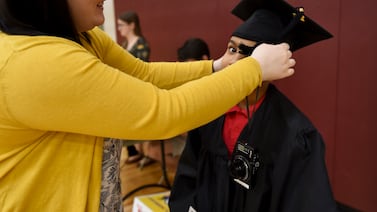With the Illinois legislature in overtime to pass the state’s fiscal year 2024 budget, Gov. J.B. Pritzker, along with leadership from the general assembly, announced Wednesday that a deal had been made.
Pritzker, House Speaker Emanuel “Chris” Welch, and Senate President Don Harmon said a budget will be filed in the Senate Wednesday, and once voted on in that chamber, will be sent to the House with the hopes of passing by Friday. The state’s fiscal year starts July 1.
The proposed budget appears to be similar to the one Pritzker put forward during his budget address in February — and mostly maintains a key second term initiative aimed at early childhood education. According to a document released by Pritzker’s office, the deal includes the governor’s requests for bigger investments in K-12 schools and initiatives aimed at solving the state’s teacher shortage issue.
Pritzker’s Smart Start Illinois would add $250 million to the Illinois State Board of Education’s early childhood block grant this year and the state’s Department of Human Services Early Intervention Program, Child Care Assistance Program, and Home Visiting Program.
In February, the governor proposed adding $100 million for early childhood education capital investment, but the document released by his office indicates that number has decreased to $50 million.
For K-12 public schools, the state board’s evidence-based funding formula would receive an increase of $350 million — keeping in line with the bipartisan promise that state lawmakers made in 2017 when the formula was created of adding a minimum of $350 million to the state’s budget each year .
The budget proposal also includes $45 million for the first year of a three-year pilot program to fill teacher vacancies in schools across the state. In February, Pritzker proposed giving $70 million per year to school districts that have a large number of teacher vacancies.
The Monetary Award Program, which provides funding for students from low-income families to get into colleges, could receive an increase of $100 million – what Pritzker asked for in February. The program’s overall budget would be $701 million.
Becky Vevea contributed to this report.
Samantha Smylie is the state education reporter for Chalkbeat Chicago, covering school districts across the state, legislation, special education, and the state board of education. Contact Samantha at ssmylie@chalkbeat.org.






